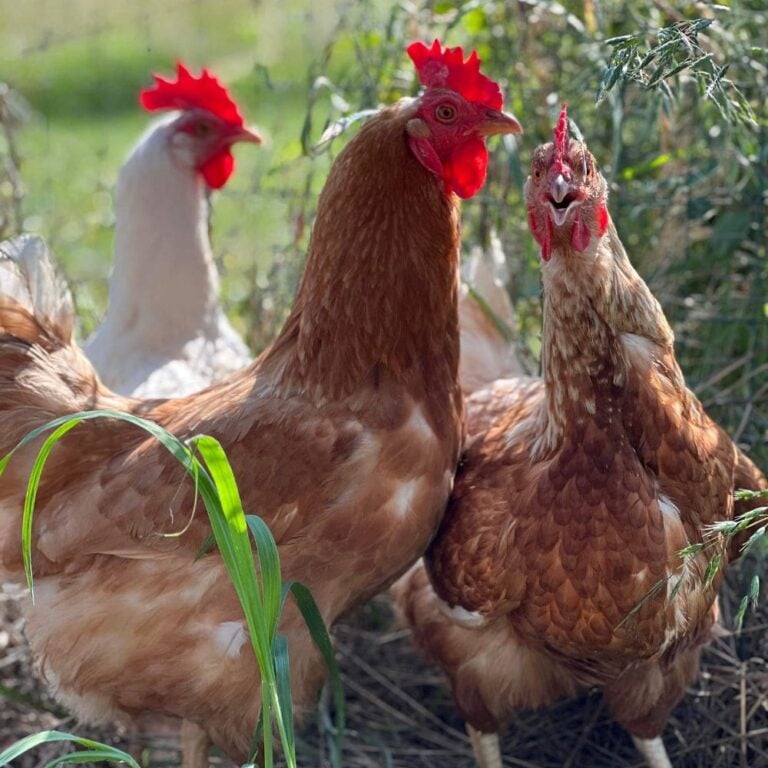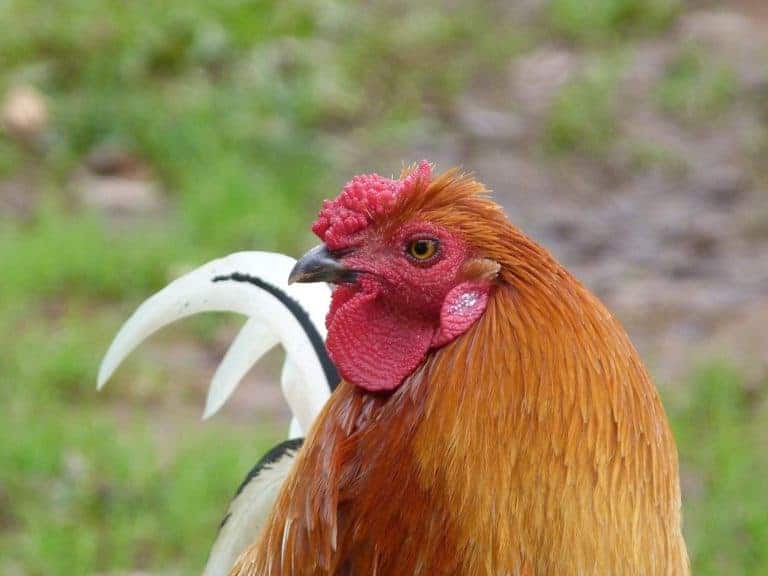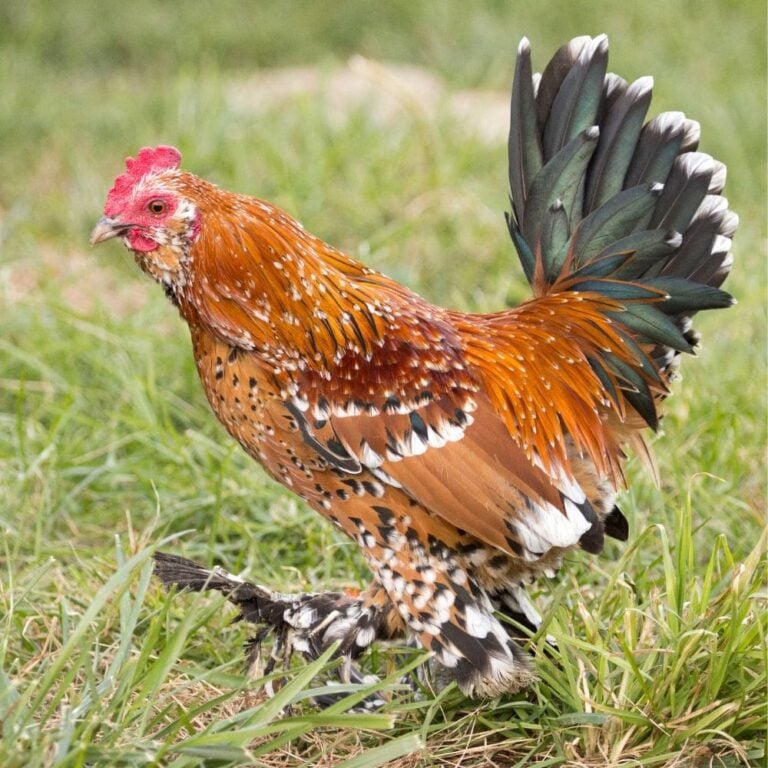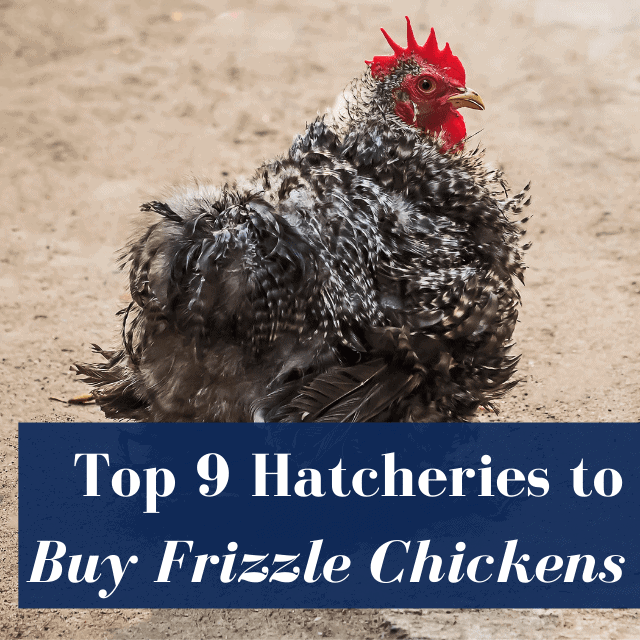A good rooster is like gold – seriously.
The purpose of a rooster is, above all, to protect your hens. Their ability to fertilize their eggs is another benefit, albeit a secondary one.
In addition to adding beauty to your flock, a good rooster will take care of your hens and provide you with companionship – and they provide hours of entertainment.
Although they tend to have a bad reputation because they crow (noisy), you’ll get a lot of satisfaction in keeping a good, productive rooster.
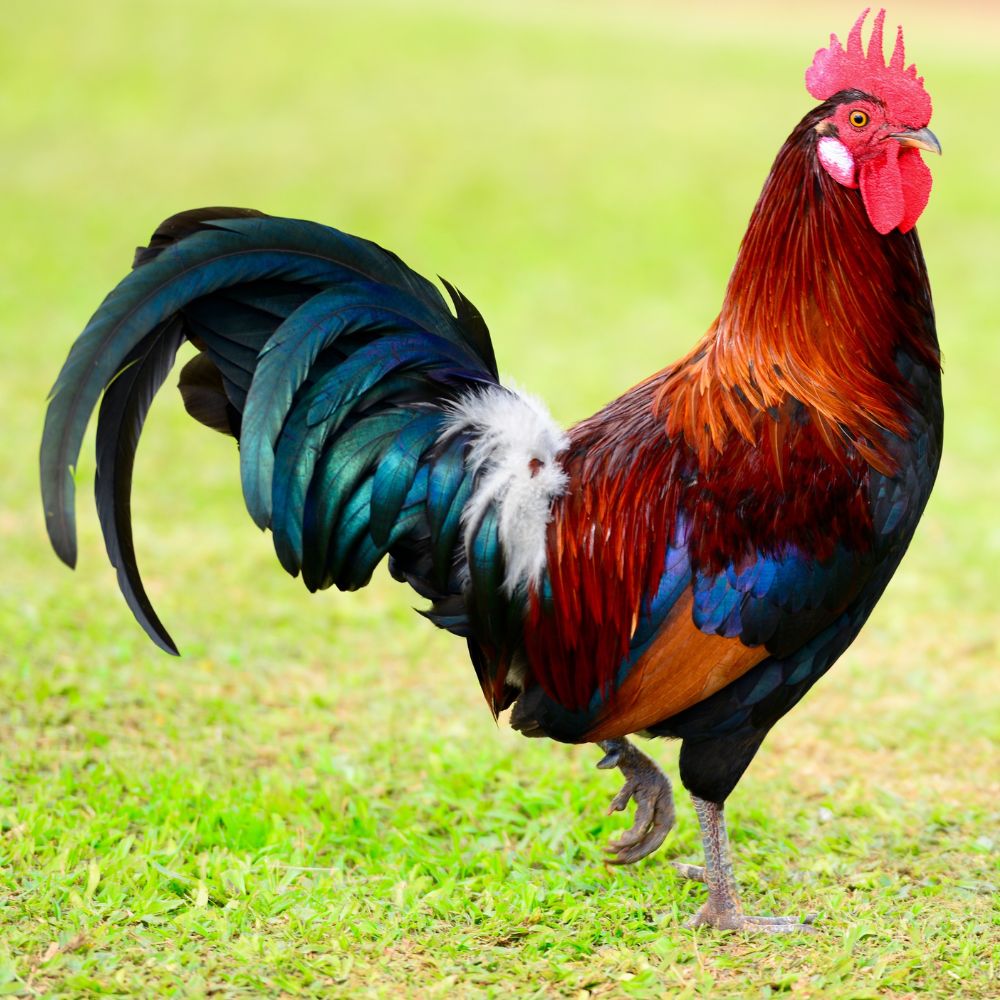
Table of Contents (Quickly Jump To Information)
Rooster FAQ
When adding a rooster to your existing flock you’ll find special challenges. Raising a rooster up with a flock of hens from chickhood is quite a bit easier. However, it doesn’t mean it can’t be done. Chicken keepers do it all the time.
Here are some frequently asked questions and their answers to help you embark on this exciting endeavor!
1. Are Roosters Mean?
Most aren’t mean, and in fact, a rooster can make a nice companion. Aside from how pretty they can be, a rooster’s main job is to protect his ladies from predators and sound the alarm when danger strikes.
If you treat him kindly and respect his space, your rooster will likely not be mean.
I’ve heard many stories of chicken owners who keep roosters as pets, and they enjoy a mutual friendship, and the rooster enjoys being a lap pet.
Every so often you will get a mean one with aggression issues, such as one that attacks people or other chickens. Bullying seems to be the goal of some roosters, but that’s more rare than not.
We had one rooster on the farm who would attack any other chicken in sight, new hens and old, familiar hens alike – we had to keep him isolated from the rest of the flock, and since he had no real use (we couldn’t breed him or keep him with the other chickens at all, and he wasn’t a pet type rooster), he was eventually removed from the farm.
We had another rooster that was overly rough with the hens when mating, and several ended up with deep wounds on their sides. One even had to be put down.
These two roosters are the exception, however, and every other rooster on the farm is pleasant to be around.
2. Are Roosters Necessary For Eggs?
No, roosters aren’t needed for your hen to produce eggs – she will do that on her own.
If you want to incubate eggs to hatch chicks, however, you will need a rooster.
While roosters aren’t necessary for eggs, keeping one around, if your city permits it, is still beneficial. Roosters instinctively protect the flock and, as leaders, search out food and tasty goodies for the girls to eat.
My king rooster will even let the ladies eat first in addition to sounding the alarm whenever a predator appears.
3. How Many Roosters Do You Need
If you want to breed, the rule of thumb is one rooster for every 10 hens.
This is also a good number if your goal is to keep a rooster to protect your hens from predators – there are only so many hens one rooster can watch.
On a homestead, it makes sense to keep as many roosters as you need unless you’re raising meat chickens because otherwise, you will feed livestock that won’t produce anything.
If you’re keeping chickens for pleasure, there’s no rule of thumb about how many roosters you should keep, except as outlined above.
A newer trend you may not have heard of is bachelor flocks. You can read about that idea here.
4. Can I Keep More Than One Rooster?
Of course, as long as they get along.
When you first introduce a new rooster (or new chickens for that matter) to the flock, it’s possible the chickens will need to “work it out” while they establish a pecking order or hierarchy. Squabbles are a necessary part of the process and is normal behavior.
Sorting out who will be king rooster shouldn’t last too long, however, and in many cases, there isn’t any drama when a new rooster joins the flock.
If you introduce a rooster that’s overly aggressive, I don’t advise keeping it for the overall health of your flock.
We had one rooster that fought any other chicken – since we had bloody combs for too long, I felt it was inhumane to keep him in the flock and a distraction from my king rooster’s main duties (keeping the hens safe.)
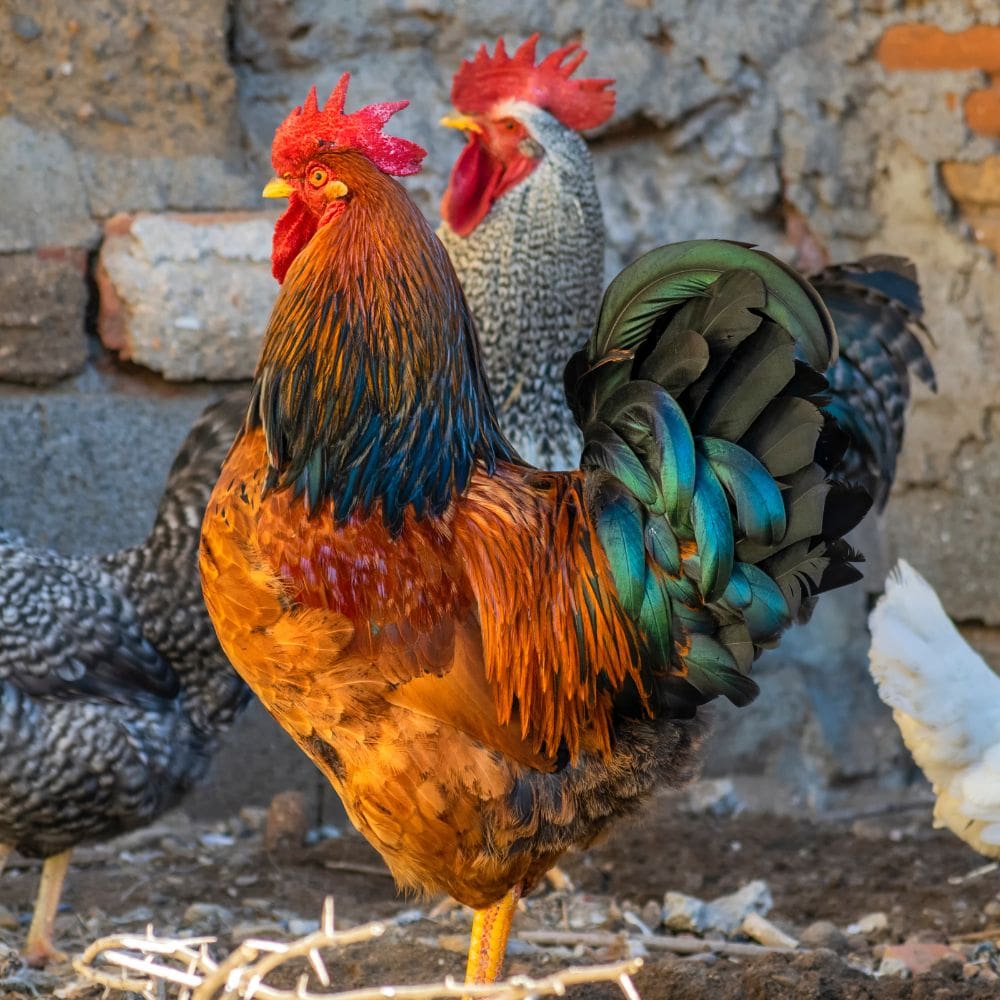
5. What Should I Do If My Rooster Attacks?
You have a couple of choices if your rooster attacks. It is possible to train it out of them.
If the rooster is just “charging,” (meaning he rushes at you but doesn’t make contact or attack in any other way) I personally don’t worry about it too much.
Your rooster is trying to establish dominance, take care of his flock, and protect his territory – he’s doing his job (obnoxiously, but he’s doing it).
If you establish that you’re the boss with your males (I chase them away), the charging should dissipate after some time.
When you’re correcting your rooster, don’t turn your back and walk away until he’s a good distance from you. If you do, he will take it as a sign that he’s won, and will try charging again the next time he gets the idea. Always be aware of your surroundings.
We have a rooster that will charge and occasionally “flog” (when they fly up on you without actually doing damage). The rooster is young, and “feeling his oats.”
When it happens, he’s immediately corrected and chased away, and the problem goes away.
While flogging isn’t pleasant, it’s not immediate grounds for banishment on the farm, especially if the rooster is responding to training and not doing any physical harm.
If your rooster attacks people or other chickens repeatedly, however, and is doing damage, it’s time to consider other options. The overall health of your homestead is most important.
6. Do You Feed Roosters Differently Than Hens?
Yes and no. A rooster can eat the same grain as your laying hens and lead a productive, healthy life.
However, if you want to save some money and your roosters don’t always live with your hens, you can transition them to a grower ration.
Because roosters don’t produce eggs, they don’t require a layer feed, which is formulated with a calcium boost for laying hens.
Don’t just feed him corn and scratch, however. Neither is formulated to give him the amount of protein he needs to remain healthy. A grower ration will meet his nutritional needs.
You can also feed your rooster an organic homemade feed alongside your hens.
Lastly, you can feed him protein-rich treats, like these, to ensure he has enough protein. Plus he’ll come running for treats and know you are his friend!
7. Exactly How Do You Introduce a New Rooster To Your Flock?
We usually put the rooster in a separate enclosure or cage that is within the same area as our current flock. In fact, we do this for new hens as well.
All the birds can get to know the newcomer (and visa versa) without the danger of getting into fights. After a few days, it’s usually safe to let them out and integrate them with the flock. Just be sure to watch the interaction for a little bit before walking away. It may take a few more days.
Summary
Roosters are beautiful, useful, and fun to have around. You just have to show him who is boss, respect his space, and provide him with enough room in the pen (or let him free range).
Using these tips, you should be able to successfully integrate a rooster into your flock, and enjoy the benefits for years. It may take a little patience on your part, but it will be worth it to complete your backyard flock.
One last thing – don’t feel bad about separating or removing aggressive roosters, you can only do so much.
Maat van Uitert is a backyard chicken and sustainable living expert. She is also the author of Chickens: Naturally Raising A Sustainable Flock, which was a best seller in it’s Amazon category. Maat has been featured on NBC, CBS, AOL Finance, Community Chickens, the Huffington Post, Chickens magazine, Backyard Poultry, and Countryside Magazine. She lives on her farm in Southeast Missouri with her husband, two children, and about a million chickens and ducks. You can follow Maat on Facebook here and Instagram here.


